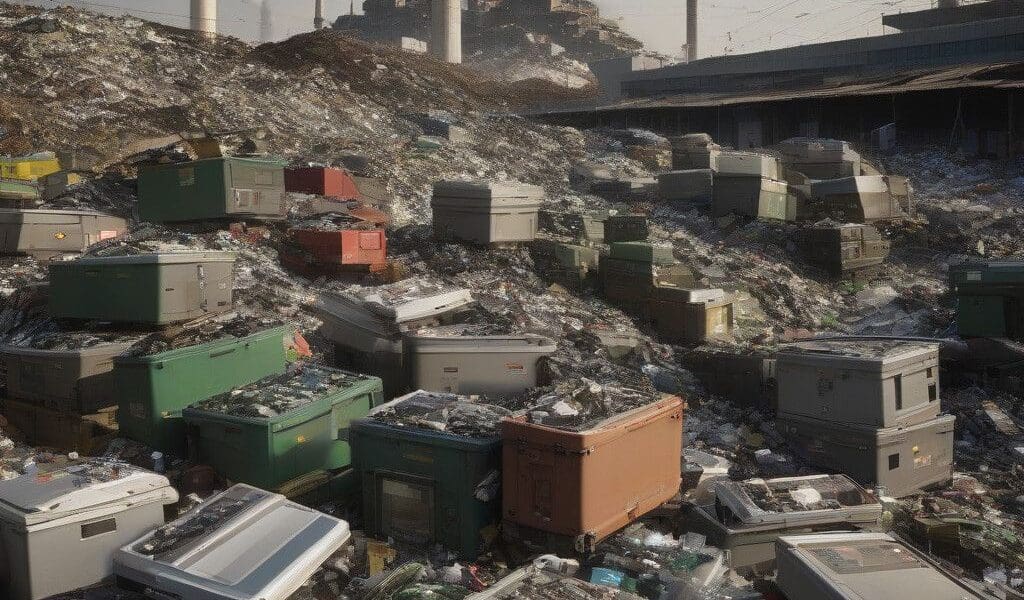Turkey's E-Waste Recycling Crisis: Economic and Environmental Impacts
Turkey ranks as the 17th largest producer of electronic waste globally, yet its e-waste recycling rate remains alarmingly low—only 10 percent. This situation leads to significant economic and environmental challenges. With approximately 700,000 tons of e-waste generated annually, the country faces an economic loss estimated at around 1 billion euros.
The improper disposal of electronic devices poses a range of threats, including environmental degradation, public health hazards, and cybersecurity risks. The pressing issue at hand is how Turkey can better manage its electronic waste to not only minimize these risks but also leverage the opportunity for economic gain through improved recycling practices.
E-waste primarily stems from small household devices such as toasters and vacuum cleaners, which account for 37 percent of the total e-waste. Major household goods contribute an additional 20 percent, while heaters and personal computing devices, including laptops and desktops, together amount to 32 percent. Mobile phones and lighting products round out the statistics, comprising 9 percent and 2 percent, respectively. This distribution illustrates that targeted recycling initiatives focusing on these categories could greatly enhance Turkey’s e-waste management.
Ali Rıza Öner, head of a waste-to-energy association in Turkey, emphasizes the potential benefits of integrating e-waste into the economy. He points out the remarkable efficiency of recycling electronic devices; for instance, extracting one kilogram of iron from e-waste requires processing only two kilograms, compared to the 200 kilograms of rock needed for traditional mining. This highlights a compelling argument for not only improving recycling rates but also refining the methods by which electronic waste is processed.
E-waste is fraught with concerns beyond environmental hazards. The potential for data breaches linked to improperly discarded electronic devices is significant. Cybersecurity experts have raised alarms about the threats posed by sensitive information left on old devices, particularly highlighted during incidents like Israel’s attacks on Lebanon, which involved the exploitation of abandoned technology. Öner stresses the importance of implementing secure disposal methods as a safeguard against cyber threats.
The low e-waste recycling rate underscores the urgency for reforms in Turkey’s approach to electronic waste management. Improving the recycling rate offers numerous benefits: it can reduce economic losses, enhance resource recovery efficiency, and lower both environmental hazards and cybersecurity risks.
One way to promote higher recycling rates is through public awareness campaigns that educate citizens on the importance of proper e-waste disposal and the benefits of recycling. Success stories from other countries can serve as models. For example, Switzerland has implemented effective recycling laws that create a more environmentally responsible culture around e-waste. They have developed comprehensive take-back programs that have significantly increased recycling rates by incentivizing consumers to participate.
Furthermore, Turkey can adopt stricter regulations on electronics manufacturers and retailers, mandating them to take back old devices. This approach not only alleviates the burden on consumers but also incentivizes companies to develop more sustainable products at the manufacturing stage.
The confluence of economic potential and ecological responsibility should serve as a catalyst for change. By harnessing the resources existing in e-waste, Turkey can not only address its environmental challenges but also create new economic opportunities within the recycling industry.
As Turkey grapples with the task of enhancing its e-waste recycling efforts, the implications extend beyond national borders. Environmental degradation and cybersecurity risks are global concerns, and Turkey’s ability to lower its e-waste footprint will contribute to broader efforts in sustainability and technological security.
In conclusion, Turkey’s low e-waste recycling rate is a multifaceted issue that necessitates urgent attention and action. The economic and environmental toll of inaction is steep, but with targeted initiatives, enhanced regulations, and public awareness, Turkey can pave the way for a more sustainable and secure future. It is time to turn the tide on e-waste and reclaim valuable resources, ensuring a healthier planet for future generations.








